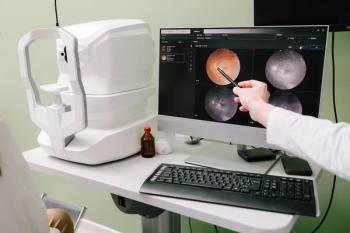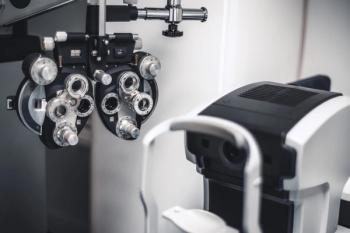
NOA 2023: Identifying eyelid conjunctiva growths and degenerations
Pierce Kenworthy, OD, met with Optometry Times to talk about his course titled, "Eyelid Conjunctive Growths & Degenerations: From Benign to Terrifying," which he will be presenting at the National Optometric Association 2023 annual convention in Fort Lauderdale, Florida.
Pierce Kenworthy, OD, caught up with Optometry Times to talk about his course that he will be presenting at the National Optometric Association 2023 annual convention in Fort Lauderdale, Florida titled, "Eyelid Conjunctive Growths & Degenerations: From Benign to Terrifying," and how it can be implemented into practices.
Video Transcript
Editor's note: This transcript has been lightly edited for clarity.
Emily Kaiser:
Hi, everyone. I'm Emily Kaiser with Optometry Times, and I'm sitting down with Dr Pierce Kenworthy, who is presenting a course entitled, "Eyelid Conjunctive Growths & Degenerations- From Benign to Terrifying" at the National Optometric Association 2023 annual convention in Fort Lauderdale, Florida. Welcome Dr Kenworthy. Thank you for taking the time to talk to me.
Pierce Kenworthy, OD:
Thank you, I appreciate it very much.
Kaiser:
First, can you tell us a little bit about your presentation?
Kenworthy:
Of course. Like you mentioned, I am very excited about this lecture, actually. It's going to be, really, a wide range of growths and degenerations of the eyelid, and also conjunctiva. I think in eye care, and especially with optometry, we are confronted with a multitude of different lesions with a very wide clinical presentation. Sometimes we'll look at something that might not look like that big of a deal, but it actually turns out to be a malignancy. Other times things look terrifying, but they're not as bad as we think they are. So, I think there's a decision tree that we often have to make when we're evaluating the eyelid and conjunctiva to figure out; Is this something that we can manage? Or, is this something that needs a little extra care, perhaps from referral to ophthalmology, ocular plastics, or dermatology? I think there's a lot of new things available to us as optometrist to try to help with that diagnosis. We're using a lot of new technology. Also, oftentimes we have to figure out when is our slit lamp not sufficient to make that diagnosis, [and] when does that tissue need to be sent out to a pathologist to actually determine what we're dealing with? It'll be a really fun lecture, I'm really excited to give it. And oftentimes, when I go to these lectures, I learn a lot more than the participants much of the time. There's so much that we have to learn from each other as a profession, and it's really a wonderful opportunity for all of us.
Kaiser:
Wonderful. How do you hope to see what is discussed at your presentation disseminated into patient care?
Kenworthy:
We're primary eye care providers. We're the first line of defense for our patients when they come in with a red eye or with a growth in their eyelid. They oftentimes want to know what it is. Sometimes we can give an answer pretty readily, and sometimes, we need additional help to figure out what that thing is. So I hope, clinically, we can build our confidence, and knowing when a referral [or] biopsy is needed.
It's amazing. Even things like ocular surface squamous neoplasia, for example, we're oftentimes treating those now with topical medications, like 5-Fluorouracil. Optometrists can play a really large role in taking care of those patients, monitoring the changes to that ocular surface, then determining [if] it needs actual surgical excision or not. So I hope, clinically speaking, we can have just a lot more confidence seeing each of those patients, know how to handle them the best, and triage the best.
Fantastic. Do you have any specific takeaway points you'd like to drive home?
First off, this profession is incredible, what we can do, but it's also very daunting. I mean, from the name of the title we have, "From Benign Bumps, to Terrifying Tumors." That can be not so scary, and also incredibly scary sometimes, so just being very well prepared for those patients. There's no reason we can't be prepared, we learned it in optometry school. We just have to remind ourselves in these lectures, what we're looking at sometimes. I think this is going to be a great opportunity.
Kaiser:
Absolutely. Well, thank you so much for taking the time to chat and I can't wait to see you in Florida.
Kenworthy:
Thank you very much. I appreciate it. Looking forward to it.
Newsletter
Want more insights like this? Subscribe to Optometry Times and get clinical pearls and practice tips delivered straight to your inbox.




























